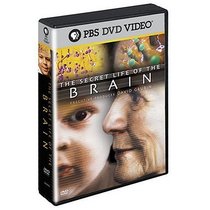| Actor: SECRET LIFE OF THE BRAIN Genres: Documentary Sub-Genres: Documentary Studio: PBS Home Video Format: DVD - Color - Closed-captioned DVD Release Date: 07/16/2002 Theatrical Release Date: 00/00/1999 Release Year: 2002 Run Time: 5hr 0min Screens: Color Number of Discs: 3 SwapaDVD Credits: 3 Total Copies: 0 Members Wishing: 1 Edition: Box set MPAA Rating: NR (Not Rated) Languages: English |
Search - The Secret Life of the Brain on DVD
  | The Secret Life of the Brain Actor: SECRET LIFE OF THE BRAIN Genres: Documentary NR 2002 5hr 0min The Secret Life of the Brain reveals the fascinating processes involved in brain development across a lifetime. The five-part series, which premiered nationally on PBS in winter 2002, informs viewers of exciting new inform... more » |
Larger Image |
Movie DetailsSimilar Movies
Similarly Requested DVDs
|
Movie ReviewsNeuroscience for the non-reader EQReader | Alturas, CA United States | 10/30/2004 (5 out of 5 stars) "Yes, yes, of course, you would learn much more about the brain by reading great books by neuroscientists--try Joseph LeDoux and Antonio Damasio, for instance. And, no, this isn't a deep and thorough scientific look at the inner space of the brain. But who cares? It's all worth it to see these amazing scientists speak with great enthusiasm about the brain--it's capacity and plasticity and vulnerability, as well as what happens when something goes wrong. I show bits of this to students in corporate courses about emotional intelligence and it's just a heck of a lot better than any lecture I could cook up or some powerpoint presentation on the topic. The graphics are great, and the human stories of brain disorders, while sad (and frankly a little tiring to watch over and over), nevertheless work to give the series emotional impact of its own. Students keep watching to see what will happen next, and the stories give staying power to the learning points. I think this is a must for 30 and 40-somethings, because it gives us a view into the baby's brain, the child's brain, the teenage brain, the adult brain, and the aging brain. If you are interested in any of these disorders or conditions, you'll find something useful in this video set: premature birth, language and learning disorders, schizophrenia, addiction, depression, post-traumatic stress, brain damage from stroke, alzheimer's." A series on Brain Disorders Laura De Giorgio | Canada | 01/23/2007 (4 out of 5 stars) "The focus of this TV series is on brain disorders, on how different malfunctions, diseases or abuses of brain manifest in the brain. The issues covered range from premature birth, where the brain didn't have yet chance to fully develop, through drug abuse in teenagers, schnizophrenia, seizures, strokes, parkinson's, alzheimer's and natural aging.
I suppose since this series is partly finances by pharmaceutical industry and companies involved in furthering of medical technology, here these companies play Gods and the solutions often involved drugging the person and when that doesn't work taking half of the brain out - as in the part of the episodes related to seizures, which starts to resemble something taking out of X-files. Throughout the episodes, human beings play the role of guinea pigs, sometimes voluntarily, sometimes involuntarily. The messages that runs as an undercurrent in these episodes is for the most part that people are helpless, drugs are the answer and if drugs cannot help them, nothing can. Part of it is almost like a commercial for drugs. There is a woman who suffered from depression, until she started taking Prozac, at which point she started to have a productive and reasonably well-adjusted life. There was just a little problem that the dose of the drug she was taking over the past decade has increased eightfold because it just doesn't have the same effect any more. It's only at the end of the movie, when a couple of people who are over 90 years old and whose brains seem to be working better then people half their age that we see that human beings are not exactly helpless over what happens with their brains, that keeping oneself active mentally and physically and having the desire and the will to live productive life makes a huge difference. In this series that was almost mentioned just like an after-thought. And there were people involved in pharmaceutical industry working hard on trying to discover drugs that can possibly replace the mental and physical activity i.e. they are studying people who are actually taking active care in their mental and physical lives, in an attempt to reproduce drugs that would bring about the same effects in those who may prefer just popping a pill than exercising their minds and bodies. There is certain economy present all across the nature, which we often refer to as "use it or lose it" and this is present when it comes to our mental and physical abilities and when it comes to neurons and neural connections - if you keep on using you mind, your body, learning new things and developing new abilities, your brain will keep on functioning great, if you stop developing your brain through new learnings, parts of your brain being to shut off from lack of use." |










![Little Miss Dolittle BD/DVD/Digital Combo [Blu-ray]](https://nationalbookswap.com/dvd/s/94/5794/345794.jpg)



